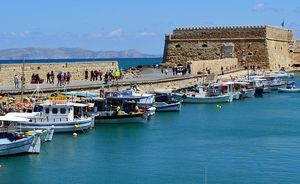June 1998 was the 360th anniversary of the death of Cyril Lucaris (Greek: Kyrillos Loukaris), Patriarch of Constantinople. However, there was no celebration regarding his life and contribution to the faith among the three hundred million Orthodox people in the world today. He was, after all, a heretic.
Lucaris was born on 13 November 1572 in Candia (modern Iraklion), Crete, which was then part of the republic of Venice but is now part of Greece. He studied theology in Venice and Padua, but it was while studying further in Wittenberg and Geneva that for the first time he encountered the doctrines of Calvin. In 1602 he was appointed patriarch of Alexandria, and in 1620 he was elected patriarch of Constantinople, and thus titular head of all the Orthodox of the Byzantine tradition. It was during this time (1627) that he sent a gift, the Codex Alexandrinus, to the King of England, Charles I, which can still be seen in the British Museum.
As patriarch, Lucaris was so encouraged by what he had learnt from the Reformers that he sent young Greek theologians to universities in Holland, Switzerland and England. One of these students, Metro-phanes Kritopoulos, a future patriarch of Alexandria, later discovered a summary of Lucaris’ beliefs, entitled Confession of faith. This contained eighteen articles in which he professed nearly all the major doctrines of Calvin and included predestination, justification by faith alone, the acceptance of only two sacraments (instead of seven, as taught by the Eastern Orthodox Church and Rome), rejection of the infallibility of the church, rejection of icons, and so on.

Lucaris was made to resign five times through the interference of the French and Austrian ambassadors to the Ottoman sultan Murad IV. Each time he was reinstated with the help of British and Dutch diplomats. The last thing Rome wanted to see was another Reformation on its eastern side. Therefore, the Jesuits, with the blessing of the Roman pope, conspired against him and persuaded the sultan that Lucaris was trying to overthrow the Ottoman Empire with the help of the Russians. Consequently, Lucaris was condemned to death and strangled by his Ottoman guards on 27 June 1638, on board a ship in the Bosphorus (in Turkey). Sadly, the Reformation in the Eastern Church was nipped in the bud and is still waiting to happen on a major scale.
In 1672, the Synod of Jerusalem condemned Lucaris as a heretic, and repudiated all biblical doctrines which he held and intended to promote. It also affirmed the traditional Orthodox teachings of transubstantiation, the equal authority of Church and Scripture, the seven sacraments, and the canonical status of the books of Tobi, Judith, Ecclesiasticus and Wisdom of Solomon. It is to this Church that today many western ‘Evangelicals’ have converted, while true Evangelicals are persecuted in Orthodox countries such as Greece, Russia. Romania, Bulgaria and Cyprus.






